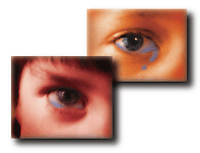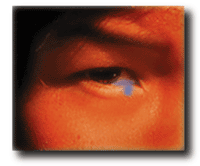 Continued...
Less
familiar in folk culture, but in fact far more frequent as a part
of everyday adult life, are occasions in which crying emerges
when a person senses that a situation has transcendent meaning
but gets a response from another who speaks of it as mundane.
For example, a woman expecting her first child remembers having
irregular mild contractions and, worried, calling her obstetrician,
only to get an "infuriating" response: "'My dear, you are worrying
entirely too much for your own good. There's no need to be concerned.'
With that, our conversation was ended, and I began to cry."
Continued...
Less
familiar in folk culture, but in fact far more frequent as a part
of everyday adult life, are occasions in which crying emerges
when a person senses that a situation has transcendent meaning
but gets a response from another who speaks of it as mundane.
For example, a woman expecting her first child remembers having
irregular mild contractions and, worried, calling her obstetrician,
only to get an "infuriating" response: "'My dear, you are worrying
entirely too much for your own good. There's no need to be concerned.'
With that, our conversation was ended, and I began to cry."
 Even
when all parties treat a turning point in the life of a person
as exceptionally significant, crying can emerge when he or she
must reenter mundane life. Joan, a Hollywood executive, volunteered
a description of crying that emerged to bridge the shock of "coming
down" from a great high. The main breadwinner for her family,
Joan had left a well-paid job under a difficult boss, living through
several months of anxiety as she searched and then negotiated
extensively over the conditions for her next job. Her new employer,
a "name" star with a record of producing commercially successful,
high-quality feminist movies, seemed ideal. In the final interview,
the new employer's unmitigated optimism and dazzling superlatives
about her qualifications complemented Joan's own extraordinary
enthusiasm. As she left the scene, Joan was imagining the spirited
conversations with spouse and friends in which she would share
her good news. Then, without warning, as she went through the
routine of getting into her car and starting toward home, she
began to cry. Her thoughts had turned to her terminally ill grandmother,
whom she had just visited on the East Coast, and to the "plug
pulling" question the family was facing. The practical task of
starting the car was the catalyst to a fall from a glittering
conversational haven back to dismal responsibilities. Crying made
an appropriately shaky bridge between the high and low grounds
of her life.
Even
when all parties treat a turning point in the life of a person
as exceptionally significant, crying can emerge when he or she
must reenter mundane life. Joan, a Hollywood executive, volunteered
a description of crying that emerged to bridge the shock of "coming
down" from a great high. The main breadwinner for her family,
Joan had left a well-paid job under a difficult boss, living through
several months of anxiety as she searched and then negotiated
extensively over the conditions for her next job. Her new employer,
a "name" star with a record of producing commercially successful,
high-quality feminist movies, seemed ideal. In the final interview,
the new employer's unmitigated optimism and dazzling superlatives
about her qualifications complemented Joan's own extraordinary
enthusiasm. As she left the scene, Joan was imagining the spirited
conversations with spouse and friends in which she would share
her good news. Then, without warning, as she went through the
routine of getting into her car and starting toward home, she
began to cry. Her thoughts had turned to her terminally ill grandmother,
whom she had just visited on the East Coast, and to the "plug
pulling" question the family was facing. The practical task of
starting the car was the catalyst to a fall from a glittering
conversational haven back to dismal responsibilities. Crying made
an appropriately shaky bridge between the high and low grounds
of her life.
 We're
often brought to tears by the need to bridge a gap of one kind
or another. The theme of an ontological gap that blocks communication
between fathers and sons is a common one in tear-jerking pop-culture
songs. Country music radio channels often keep at least one in
circulation. Harry Chapin's "Cat's Cradle" is a standard oldie
on American pop music charts. Using the format of a phone conversation,
it tells of a father who is too busy to speak to his son and then,
as an old man, finds his son too busy to speak to him. On a more
everyday basis, mothers are moved to tears as they silently regard
their precious children. Today, "men's groups" hold retreats in
which one man role-plays a distant, silent, macho-styled father,
and tells his "son" that he loves him. As the "father" overcomes
the mythical silence of his role, the message of love is received
through teary eyes.
We're
often brought to tears by the need to bridge a gap of one kind
or another. The theme of an ontological gap that blocks communication
between fathers and sons is a common one in tear-jerking pop-culture
songs. Country music radio channels often keep at least one in
circulation. Harry Chapin's "Cat's Cradle" is a standard oldie
on American pop music charts. Using the format of a phone conversation,
it tells of a father who is too busy to speak to his son and then,
as an old man, finds his son too busy to speak to him. On a more
everyday basis, mothers are moved to tears as they silently regard
their precious children. Today, "men's groups" hold retreats in
which one man role-plays a distant, silent, macho-styled father,
and tells his "son" that he loves him. As the "father" overcomes
the mythical silence of his role, the message of love is received
through teary eyes.





![]()
 Continued...
Less
familiar in folk culture, but in fact far more frequent as a part
of everyday adult life, are occasions in which crying emerges
when a person senses that a situation has transcendent meaning
but gets a response from another who speaks of it as mundane.
For example, a woman expecting her first child remembers having
irregular mild contractions and, worried, calling her obstetrician,
only to get an "infuriating" response: "'My dear, you are worrying
entirely too much for your own good. There's no need to be concerned.'
With that, our conversation was ended, and I began to cry."
Continued...
Less
familiar in folk culture, but in fact far more frequent as a part
of everyday adult life, are occasions in which crying emerges
when a person senses that a situation has transcendent meaning
but gets a response from another who speaks of it as mundane.
For example, a woman expecting her first child remembers having
irregular mild contractions and, worried, calling her obstetrician,
only to get an "infuriating" response: "'My dear, you are worrying
entirely too much for your own good. There's no need to be concerned.'
With that, our conversation was ended, and I began to cry."  Even
when all parties treat a turning point in the life of a person
as exceptionally significant, crying can emerge when he or she
must reenter mundane life. Joan, a Hollywood executive, volunteered
a description of crying that emerged to bridge the shock of "coming
down" from a great high. The main breadwinner for her family,
Joan had left a well-paid job under a difficult boss, living through
several months of anxiety as she searched and then negotiated
extensively over the conditions for her next job. Her new employer,
a "name" star with a record of producing commercially successful,
high-quality feminist movies, seemed ideal. In the final interview,
the new employer's unmitigated optimism and dazzling superlatives
about her qualifications complemented Joan's own extraordinary
enthusiasm. As she left the scene, Joan was imagining the spirited
conversations with spouse and friends in which she would share
her good news. Then, without warning, as she went through the
routine of getting into her car and starting toward home, she
began to cry. Her thoughts had turned to her terminally ill grandmother,
whom she had just visited on the East Coast, and to the "plug
pulling" question the family was facing. The practical task of
starting the car was the catalyst to a fall from a glittering
conversational haven back to dismal responsibilities. Crying made
an appropriately shaky bridge between the high and low grounds
of her life.
Even
when all parties treat a turning point in the life of a person
as exceptionally significant, crying can emerge when he or she
must reenter mundane life. Joan, a Hollywood executive, volunteered
a description of crying that emerged to bridge the shock of "coming
down" from a great high. The main breadwinner for her family,
Joan had left a well-paid job under a difficult boss, living through
several months of anxiety as she searched and then negotiated
extensively over the conditions for her next job. Her new employer,
a "name" star with a record of producing commercially successful,
high-quality feminist movies, seemed ideal. In the final interview,
the new employer's unmitigated optimism and dazzling superlatives
about her qualifications complemented Joan's own extraordinary
enthusiasm. As she left the scene, Joan was imagining the spirited
conversations with spouse and friends in which she would share
her good news. Then, without warning, as she went through the
routine of getting into her car and starting toward home, she
began to cry. Her thoughts had turned to her terminally ill grandmother,
whom she had just visited on the East Coast, and to the "plug
pulling" question the family was facing. The practical task of
starting the car was the catalyst to a fall from a glittering
conversational haven back to dismal responsibilities. Crying made
an appropriately shaky bridge between the high and low grounds
of her life. We're
often brought to tears by the need to bridge a gap of one kind
or another. The theme of an ontological gap that blocks communication
between fathers and sons is a common one in tear-jerking pop-culture
songs. Country music radio channels often keep at least one in
circulation. Harry Chapin's "Cat's Cradle" is a standard oldie
on American pop music charts. Using the format of a phone conversation,
it tells of a father who is too busy to speak to his son and then,
as an old man, finds his son too busy to speak to him. On a more
everyday basis, mothers are moved to tears as they silently regard
their precious children. Today, "men's groups" hold retreats in
which one man role-plays a distant, silent, macho-styled father,
and tells his "son" that he loves him. As the "father" overcomes
the mythical silence of his role, the message of love is received
through teary eyes.
We're
often brought to tears by the need to bridge a gap of one kind
or another. The theme of an ontological gap that blocks communication
between fathers and sons is a common one in tear-jerking pop-culture
songs. Country music radio channels often keep at least one in
circulation. Harry Chapin's "Cat's Cradle" is a standard oldie
on American pop music charts. Using the format of a phone conversation,
it tells of a father who is too busy to speak to his son and then,
as an old man, finds his son too busy to speak to him. On a more
everyday basis, mothers are moved to tears as they silently regard
their precious children. Today, "men's groups" hold retreats in
which one man role-plays a distant, silent, macho-styled father,
and tells his "son" that he loves him. As the "father" overcomes
the mythical silence of his role, the message of love is received
through teary eyes.